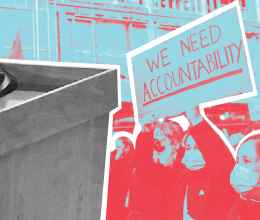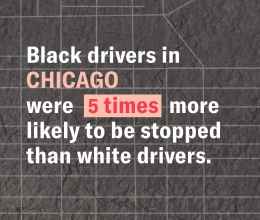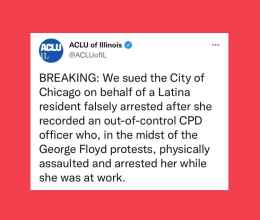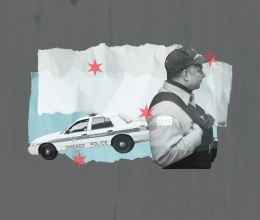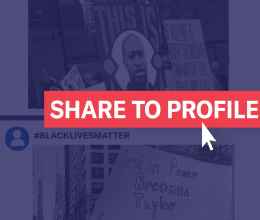
Communities United, Community Renewal Society, Next Steps, ONE Northside, and the ACLU of Illinois sued the City of Chicago. Their lawsuit challenged the City’s policies and practices that authorize Chicago police officers to use excessive force, to use unlawful force on black and Latino people, and to use unnecessary force on individuals with disabilities. The lawsuit sought a permanent injunction requiring the City to modify its policies, training, supervision, and disciplinary systems for its police officers.
This lawsuit was preceded by investigations and attempts to obtain police reform outside of the courtroom. On December 7, 2015, the United States Department of Justice (DOJ) opened an investigation into the Chicago Police Department (CPD) to determine whether the CPD engaged in a “pattern and practice” of unlawful conduct, including the use of excessive or unnecessary force. In January 2017, with one week left in President Obama’s administration, the DOJ issued a 164-page report detailing its findings. Confirming what many residents in Chicago already knew, the DOJ found that the City’s police engaged in a pattern or practice of using unreasonable force, including deadly force. The DOJ’s report included examples of unjustified force being used on individuals in mental health crisis, and the DOJ found CPD was not allocating sufficient resources to properly prepare officers to respond to mental health calls.
The DOJ recommended that the City enter into a consent decree—a court-enforced agreement that would hold the City accountable to making the DOJ’s recommended reforms. The Trump administration, however, refused to negotiate a consent decree.
Mayor Rahm Emanuel promised to work with Illinois Attorney General Lisa Madigan to implement reform, yet no agreement had been reached as of the date the ACLU filed suit. Moreover, no community groups were involved in the Mayor’s negotiations, nor was there any indication that their consent decree would include concerns of individuals with disabilities. By filing this lawsuit, these groups ensured that the communities affected by the police’s use of force had a real role in ensuring that the CPD is reformed.
After our lawsuit was filed, the ACLU and our partner clients reached an agreement with the City and Illinois Attorney General to pause the litigation, in exchange for a role in the process of developing and enforcing a consent decree. The organizations provided input during the drafting, hundreds of comments after a draft decree was released in the late summer of 2018, and written comments and oral testimony on the proposed consent decree to the federal court before and during a two-day hearing in the autumn of that year. While the plaintiffs ultimately supported approval of the consent decree, their comments emphasized many of the ways those reforms did not go far enough, particularly for people with disabilities.
On January 31, 2019, U.S. Judge Robert Dow approved a final consent decree to guide reform in State of Illinois v. City of Chicago, No. 17-cv-6260. The consent decree became effective upon the appointment of a Monitor, on March 1, 2019. The lawsuit settled in May 2019, and both the consent decree and the settlement agreement ensure that the plaintiffs have an ongoing role in, and the right to enforce, the consent decree.
The initial two reports on implementation by the Monitor team revealed that the City failed to meet more than 70% of the deadlines they agreed to under the consent decree during the first year. Most troubling was that the City had failed to adequately engage the community in creating new policies and practices to advance the work of changing the way that the City of Chicago is policed. We are working with the Monitor and the City to ensure that there is a plan for the City to catch up and for the voice of community members to inform this process.
Learn more about our consent decree with CPD
Communities United is an organization that uses grassroots community organizing to bring about policy change on a variety of social justice issues. Its mission is to develop local leaders to address immigrants’ rights, affordable housing, public education, healthcare, violence prevention and gang involvement of young people, and workers’ rights. As part of an alliance of community-based organizations, Communities United also advocates to strengthen Chicago Police Department accountability and has organized youth around policing issues.
Community Renewal Society (CRS) is a 135-year-old faith-based organization that works with people and communities to address racism and poverty. CRS organizes its member congregations to work on issues at the local level, including housing and employment. One of CRS’s primary campaigns is police accountability and reform.
Next Steps is an organization dedicated to ensuring that people with lived experiences of homelessness, mental illness, substance use, and/or substance abuse lead the development and implementation of healthcare, housing, and social policies at the state and local levels. It was recently charged with a federal grant to ensure that a network of people with lived experience with mental illness can participate in the policy decisions that impact them.
ONE Northside is an organization that organizes diverse communities in the areas of violence prevention, public education, affordable housing, healthcare and mental health justice, youth empowerment, and economic justice. ONE Northside has specifically offered policy assistance to CPD in an effort to reform its policies and practices.
